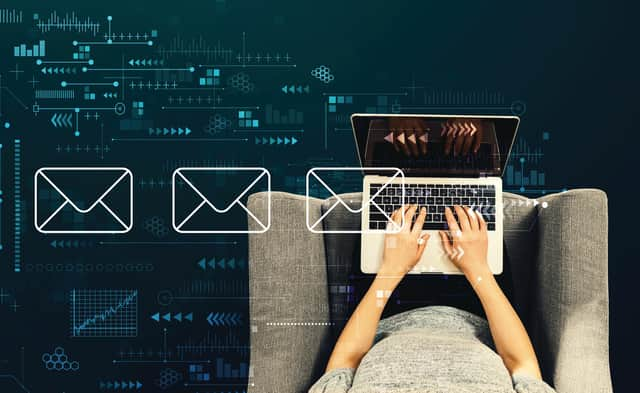Doing Data Better conference: Who do we trust with our information?


Jamie Bartlett, an author and broadcaster on technology issues, said we should “re-set” our relationship with big tech companies after a huge acceleration in our use of online platforms.
He told The Scotsman’s Doing Data Better event that he was “very nervous” about giving all his data to the likes of Amazon before the pandemic, but added: “Any of my ethical considerations to do with using one or two very large online commerce companies flew out the window because I needed toilet paper, and I needed it from Amazon Prime immediately.
Advertisement
Hide AdAdvertisement
Hide Ad“If we were making moves towards a more careful, considered way of using internet-based services, it flew out the window, and we zoomed ahead far faster on a far faster trajectory with far less concern than ever before.”
Bartlett said that before the pandemic, personal data and data security had become part of the political and social conversation. “That was a huge step forward, and then all of a sudden we were all forced to stay at home and become even more digitised than ever.”
The explosion of digital technology was a huge positive during the pandemic, he said, asking: “Where would we have been without the amazing ability of machines to keep us connected? It really worked – not to mention, of course, how important data was in trying to work out the spread of the virus.”
But, Bartlett added: “This turbo-charged some of the deeper concerns that many of us, me included, had about our reliance on certain types of technology and the production of data through that technology.”
He said the pandemic had deepened the divide between our “analogue democracy, institutions and laws, and our digital technology, which doesn’t follow the same norms logic, or patterns”.
He continued: “Part of the job of societies is to keep the analogue and digital close together, or at least minimise the gap. Suddenly we’ve zoomed ahead for five or seven years [in terms of technology], but without the time to catch up. Are we going back to 2020 or staying in 2025? This is probably the biggest question that we all have to consider.”
Bartlett thought we hadn’t yet grasped the magnitude of thechanges, “because we’ve been living in a crisis for 18 months but we don’t realise just how dramatic all of these changes will be for all of us”.
Another big data question was the “blurring of boundaries between work and home”.
Advertisement
Hide AdAdvertisement
Hide AdBartlett said: “For a long time, I’ve noticed a very worrying trend. We have a work email, and we sometimes use it to sign in or create accounts with things that have nothing to do with work. That’s a real problem with this; I see stolen data turning up on the dark net.
“Maybe people’s work systems are extremely secure, but then they go on to a gaming site and use exactly the same work email/password combination. Six months later, the gaming site, which has very bad internet security, is hacked into. Two months later, that work email and username/password combination is for sale on a darknet marketplace for a fraction of a penny.
“You can then be bought. It’s not just access into the gaming site, it’s access into your work system, which is much more serious. That blurring is extremely risky.”
Bartlett said that as we generated more and more data, we became “more reliant on those systems”.
“I think we need to think more carefully about what to do now,” he said, before adding that we could all help those who were still finding their way in the online world: “There is an important lesson for everyone who’s going online more to learn the basics. Even at an individual level, each of us could help our friends and family, with real basics on data security.”
Bartlett said a longer-term reset involved understanding the right to the “portability” of data. “All of us have the right [under the General Data Protection Regulation, GDPR] to ask companies to tell us what data they have, and even give the data back if we so demand.
“As more of us head online and more and more data is produced, I think that right becomes very important.”
He suggested consumers could come together, maybe via intermediary companies, to elicit a major change: “We want a million consumers to all give us permission to go to every single company, find out the data they have, and then sell that directly to advertisers and share that equitably between all of you as you wish. This would be transformational.
Advertisement
Hide AdAdvertisement
Hide Ad“Suddenly people would understand the data exchange and the value that it can bring, but it requires co-ordination from citizens, and also new companies and new business models. I’d like governments to try to incentivise people to make better use of their data.”
Jarmo Eskelinen, executive director of the Data-Driven Innovation Initiative, said we were still in an emerging state of finding real trust in how our data is used.
“We need a third model to trust data, as opposed to corporate revenues models or, more worryingly, oppressive government-driven models coming from China. We need a data environment which strikes a balance between privacy and public good.”
A digital version of the full conference report can be found here.